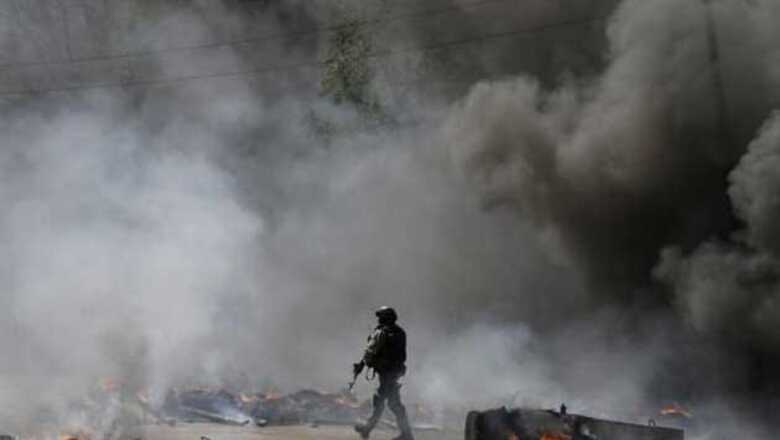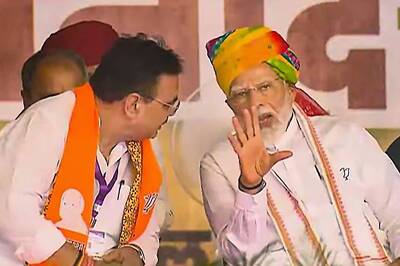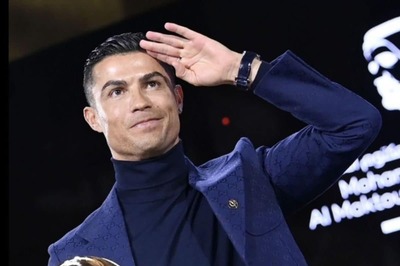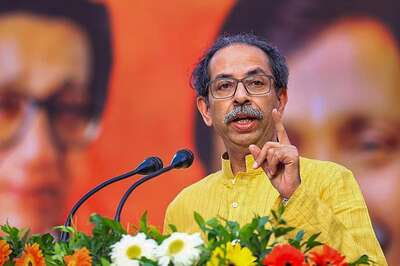
views
Brussels: After months of hesitation, the EU agreed on Tuesday to impose economic sanctions against Russia, hoping this "strong warning" would make it change course in Ukraine as fighting intensified around cities held by pro-Russian rebels.
But at the same time the European Union told Moscow that should it reconsider its policy on Ukraine, the 28-nation bloc also could shift course, despite all the damage done.
The new measures impose restrictions on the finance, defence and energy sectors so as to increase the cost to Russia of its continued intervention in Ukraine.
Notably, Russian state-owned banks will find access to European financial markets limited, meaning their costs could rise, with a knock-on effect on Russia's struggling economy.
The measures are "a strong warning (that the) illegal annexation of (Crimea) and deliberate destabilisation of a neighbouring sovereign country cannot be accepted in 21st century Europe," said Herman Van Rompuy, president of the European Council.
If Russia does not change direction, "it will find itself increasingly isolated by its own actions," Van Rompuy said in a statement.
"The European Union will fulfil its obligations to protect and ensure the security of its citizens. And the European Union will stand by its neighbours and partners," the statement added, apparently referring to other ex-Soviet states now EU partners Georgia and Moldova.
The EU however "remains ready to reverse its decisions and re-engage with Russia when it starts contributing actively and without ambiguities to finding a solution," he added.
For months since the crisis broke in November, the EU had restricted itself to so-called 'Phase 2' asset freezes and visa bans on those implicated in or profiting from the Ukraine crisis.
Sanctions 'inevitable'
Washington complained such measures were not enough, suggesting that Brussels was being held back by the EU's extensive economic ties with Russia, which supplies a third of the bloc's gas and is a major trade partner.
The loss of Malaysia Airlines flight MH17, however, dramatically changed thinking, even among holdouts such as Germany and Italy, and put broad 'Phase 3' economic sanctions at the top of the EU agenda.
"The decision today was inevitable," German Chancellor Angela Merkel said in a statement that also urged the Russian leadership to "pursue the path of de-escalation and cooperation" in the Ukraine conflict, warning of further steps if it does not.
US Secretary of State John Kerry said separately that Washington was also "preparing additional sanctions, with Europe," adding that Russian President Vladimir Putin "still has a choice" in what course to take in Ukraine.
The EU ambassadors also agreed Tuesday to impose asset freezes and visa bans on four close Putin business associates, the first time the bloc has targeted such figures, with another four people and three companies also targeted.
Details of their names will be made available in the EU's Official Journal, probably Wednesday, with the new sanctions likely to come into force Friday or Saturday once the legal procedures are completed.
Moscow has consistently derided the US and EU sanctions, condemning them as ineffective and counterproductive to shared interests in such key areas as the fight against terrorism.
"I can assure you that we will overcome any difficulties that develop in various sectors of the economy and maybe we will become more independent and confident in our own strength," Russian Foreign Minister Sergei Lavrov said on Monday.
On the other side, British energy giant BP, which owns almost 20 per cent of Russian state oil giant Rosneft, warned Tuesday that the new sanctions could seriously damage its interests.
An EU diplomat cautioned that as sanctions increase, Putin may feel he has less to lose and it should not be forgotten the Russian leader has many options.
"He could take military action, he could increase help for the rebels, he could help them bring down Ukraine government planes," the diplomat said.
Fighting by MH17 crash site
Another EU diplomat played down this possibility, saying the bloc's leaders will have taken it into account when they agreed to up the ante with Putin.
"Putin is going to try and divide the Europeans and his response will be a test of the EU's unity," the diplomat said.
Western sanctions in the past have proven controversial, failing to deliver results as quickly as hoped in such cases as Cuba and Zimbabwe, countries that suffered badly but also learned how to get around many of the restrictions.
Heavy shelling was reported Tuesday in eastern Ukraine, forcing international experts to again scrap plans to reach the MH17 crash site.
The remains of some of the 298 victims, who included nearly 200 Dutch, still lie there 12 days after the disaster.
The Ukrainian military said they were not involved in hostilities in the area, charging instead that insurgents were firing on their positions from nearby towns.
Key rebel-held cities further afield came under heavy bombardment, as the government pushed its offensive to regain control of the eastern industrial heartland.
In Donetsk -- the biggest rebel stronghold of a million people just 60 kilometres away from the crash site -- AFP journalists heard several explosions and saw several damaged buildings.
Heavy fighting was also ongoing in another rebel stronghold Lugansk where local authorities reported five killed and eight wounded in the past 24 hours.
More than 1,100 people have been killed in the fighting in the past three months, the United Nations said.




















Comments
0 comment